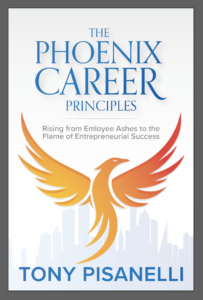Employees whose careers are threatened by change or are drowning in deep dissatisfaction turn to Tony Pisanelli to advance confidently to a more secure and satisfying working life. Observing numerous work colleagues experience deep career dissatisfaction and who were unprepared for an unexpected job loss was the catalyst to become a Career Transformation Coach and Thought Leader.
Tony Pisanelli is the creator of the E3 Career Transformation Method a coaching framework that charts an entrepreneurial path by recombining existing core capabilities to create a career that rises above a vulnerable job for an income to a life worth living.
He is also the author of The Phoenix Career Principles that shows employees how become the driving force of their career. The book provides a blueprint to help its readers, keep their job while others are losing theirs, leave the job they hate and step into a new world of employment opportunities.
Jules: Share your background and the day you had an epiphany that changed your life.
Tony: I began my career journey in the early 1980s as a graduate accountant working for a large government organization. On the surface, to my friends and colleagues I had struck gold: a high-paying professional occupation with a top firm, great opportunities for promotion, and the icing on the cake was that it all came with a security guarantee, known at the time as a “job for life”. It ticked all the boxes, so what more could anyone possibly want?
However, this apparent rose garden came with a huge and painful thorn – I slowly awoke to the fact that I hated my job. Drew Carey once said, “Oh, you don’t like your job? There’s a support group for that; it’s called everybody,’ and I was now a member of this most unexclusive club.
Because most people keep their job dissatisfaction to themselves, I thought I was alone in my predicament, so I sought solace in nature and would go for walks in a nearby park every lunchtime in an attempt to recapture the freedom I feared was gone forever as a slave to my job, and to ponder why I was so dissatisfied.
I was trapped in a mechanical and monotonous routine that never varied: collecting data one week, classifying it the next, analyzing it in week three, and finally producing accounting information in the last week of the month. Each period was a carbon copy of the one before, and the thought of performing this drudgery for years and decades was intolerable, but I could see no way out.
After years of ‘suffering’ in silence, one day I had a conversation with a work colleague that was to change my life. Perry and I did exactly the same job, but I’d noticed that where I felt bored and stifled, he was filled with a passion and enthusiasm for the work that just made no sense to me.
‘How can you possibly enjoy this work?!’ I asked him, and he then told me how he’d grown up on a farm where the family would experience good and bad harvests, so his parents had learned to save money in the rich years to protect them from the poor ones while many of their neighbors spent everything in the good years, and then paid the price of hardship in the bad.
This taught Perry the importance of managing money wisely, which became his motivation to go into accountancy. He loved his work because for him it wasn’t an end (dead or otherwise) in itself, but an apprenticeship for one day running his own financial planning business. He saw his purpose as helping people manage their dollars wisely to support their life priorities through good and bad times, and he was excited at the prospect of one day making a difference in their lives.
This was my illuminating Aha! moment. Perry loved his work because it was connected to his great life ambition, and that crucial factor made all the difference. I saw that for me, and for most other people, work was merely about an income – about desperate survival rather than inspired purpose, and we only get what we aim for.
As Thoreau wisely said, “The mass of men lead lives of quiet desperation”, and I finally realized that my ‘security’ was anything but – the price, my life, was far too high for so little reward. My career preserved my physical body but did nothing to nourish my heart, and that one conversation with a wise man was enough to open my eyes and begin to turn my life around. Perry never knew the gift he gave me that day, but I will always thank him for providing the key to my employment prison, and all that has come to me since. Successfully navigating a corporate career through several reinventions.
Over the more than thirty years of my corporate career I was compelled to reinvent myself several times, and what seemed an unwelcome process at the time has since proved invaluable to my later vocation. The first reinvention was away from mechanical and monotonous roles so unsuited to my nature; I knew I couldn’t be at peace with myself performing routine accounting work, processing abstract financial results in which I saw no connection to the company’s operations and financial results.
As the American psychologist Abraham Maslow observed, “A musician must make music, an artist must paint, a poet must write, if he is to be ultimately at peace with himself,’ so I chose to pursue more commercial roles that would broaden my business acumen. I felt comfortable on this new path because I was expanding my knowledge and working with people who were not accountants: the opportunity to learn from engineers, business strategists, technologists, and a wide range of local and international consultants was highly enriching, both personally and professionally.
Some seven years after my first shift from accountant to business analyst, I again found myself at my next reinvention crossroads. In March 2000, I was called into my then-manager’s office, where after reflecting on my significant achievements over the previous six months, he leant forward to whisper conspiratorially, “Are you interested in taking a termination payout”?
The company was about to undergo a significant staff reduction, and my generalist business skills were in oversupply within the organization. What I thought a bombshell at the time was actually a powerful learning moment, and even a gift. My years of loyal service were no guarantee of employment tenure – ‘the job for life” belief had finally been shattered.
Fortunately, my solid performance track record bought me time to find alternate roles in the company, because I knew I was not yet ready to fly the employment nest. Acting on advice from my manager, who made it clear that I needed to develop a “standout factor” to differentiate myself from the generalist employee crowd, my second career reinvention was now underway – I stepped out of my generalist, vulnerable business analyst role and into the position of risk management.
Risk Management was growing in prominence both within the company and the broader commercial employment world and was considered a highly valued specialty, so I made it my focus to master the subject by developing the company’s risk management guidelines, facilitating risk assessments, providing consultancy advice in the company, training other staff on the subject, and writing board reports that highlighted key risks in the business and how well they were being managed.
So, I was ‘safe’ again, but inevitably I came face-to-face with my next shift – I felt ready to leave the employee role behind and wanted my payout, now significantly larger than what had been offered fifteen years earlier. Unfortunately, my risk management skills had become so valued that my request was denied. We were again at cross-purposes – when I wanted to stay, they tried to get rid of me; now that I wished to leave, they wanted me to stay. No longer prepared to keep my life on hold, I decided to go without the golden handshake, which is why I’m speaking to you now. No risk, no reward – but it has to be the right risk, for the right reward.

Jules: Can everyone reinvent themselves?
Tony: Yes! Not only can anyone do it, we all actually do it every day, without even being aware of the process. The thing is, most people simply recreate themselves over and over again in the same mould, not realizing that they have the freedom to become whatever they would love to be – all it takes is intelligence, courage, will, and a little guidance certainly helps (thank you, Perry). Oh, and an inspired and inspiring purpose as well, which is where people like me come in.
Career reinvention is relatively easy when it involves changing positions within one company or leaving to work for another employer. The great leap of working for yourself is a lot more challenging and is therefore one that most people never make until they’re pushed, which is not ideal.
What makes such dramatic change possible is a powerful why? As the philosopher Nietzsche said, “He who has a big enough ‘why’ can bear any ‘how’ “. That ‘why’ is the motivating purpose for life, and though it’s always unique, everybody has one. Finding your purpose has tremendous power to transform your circumstances and overcome obstacles, and the day you find it is the day you begin to not just survive but truly live – that is the great reinvention, when you finally accept the responsibility to create your own life.
Another important component of major career reinvention is strategic planning, something most people don’t give enough consideration to, with inevitable and unwelcome consequences. The ‘Great Resignation’ phenomenon of the last 2 years, where many people left their jobs without appropriate planning, has become ‘The Great Regret’ when they are faced with the challenge of steering a career course without a map or compass. My inspiration is in helping people first realize their purpose, then creating a strategy to make it real. It’s not easy, but if it were everyone would already be doing it, right?
Jules: You are a leading global Career Transformation Coach. How are you helping others to secure their careers and obtain purposeful and satisfied lives?
Tony: I observed a revolutionary trend in the later phase of my corporate career, where businesses began shedding many people who were considered conservative and cautious – no longer valued as ‘loyal employees’, they were now seen as blockers of the much-needed corporate change necessary for success in a more competitive domestic and global marketplace.
My employers were undergoing their own reinvention from a government-protected monopoly to a competitive player, and this transformation was enabled by hiring entrepreneurial-minded go-getters to replace the preservers of the status quo. Theses entrepreneurial types were change-makers who arrived to dismantle outdated ways of operating, drive higher performance standards, and create stronger team cultures across the company.
I advise my clients that if they wish to secure their careers, either working for an employer or one day for themselves, they must become an entrepreneur – someone who thinks and acts for a purpose-focused future, unafraid of change.
The key to this transformation is to start thinking like an entrepreneur. I help people understand they are the centre of their own lives, and that until they stop thinking like an employee, they will remain one. I do this by changing their minds – their ideas about who they are, what they have to offer the world, and what they deserve to receive in exchange for their service, and that makes all the difference. All true change starts with you.

Jules: Tell us about the Career Transformation Method.
Tony: The E3 Method is aimed at helping professionals become Entrepreneurs and Essential Experts by developing a core set of specialist and commercial competencies. These skills allow them to not only adapt to, but even anticipate, today’s fast-changing employment world. This adaptability makes my clients essential to their current employer, valuable to the broader marketplace, and opens the door to self-determination.
In my own situation I’ve combined my risk management skill with coaching abilities to help professionals protect their careers from catastrophic job loss and corrosive career dissatisfaction. I also strongly encourage them to think like entrepreneurs by linking their capabilities to multiple sources of income, which makes them more confident, creative, and valuable in today’s fast-changing world.
Jules: What makes it Unique?
To succeed in a highly competitive coaching world (and indeed any area of human endeavour) it’s important to create a unique proprietary methodology. The E3 method is a vital and fundamental point of difference in the career-coaching domain. Many in this field focus almost exclusively on assisting their clients to move into their next job or win a promotion by updating their resumes, polishing their interview skills, or strengthening their capabilities – all useful details, but hardly profound and certainly not transformative.
The E3 Method is aimed at taking men and women beyond the job level and creating an entrepreneurial career mindset. Whether they choose to remain an employee, or move on and up to something greater, this method elevates my clients out of fear-based income dependence, survival thinking, and ladder-climbing to find true career, financial, and personal fulfillment.
In contrast to the many who remain mired in hardship and desperation, the people I coach are enabled to view their career as a journey of increasing opportunity where they can not only reap great financial rewards, but express who they are, fulfil their potential, and find a meaningful purpose – all while experiencing the satisfaction and even joy that comes from doing what you love.
Jules: Share success stories.
Some of my most significant success stories are about renewing people’s energy, enthusiasm, and sense of purpose, and overcoming major challenges in the way. I recall a young man who was deeply despondent about a sales role that involved calling clients to sell them a product they simply didn’t need. The constant rejection he experienced progressively eroded his self-confidence, and he had begun to dread each day.
During our coaching sessions we uncovered his passion for luxury cars, which began at age seven when his father took him to the Formulae 1 Grand Prix where he got to see and actually touch a Ferrari. This insight gave him the motivation to leave the job he loathed and launch a career selling luxury motor vehicles – selling something he loved to people who loved what he had to offer. The new career was further enhanced by the new luxury car that was part of his remuneration package.
I once worked with a middle-aged gentleman who felt bitter and depressed after losing his job. Upon deeper exploration we discovered that for years he’d secretly harbored a desire to work for himself, but just couldn’t give up his job ‘security’ to do it. What initially seemed a painful dismissal and devaluation of his worth was actually a recognition by the outer world of his inner dream. The company had made the decision he lacked the courage to make for himself, and rather than losing anything he was now free to pursue his next career, one that aligned with his entrepreneurial heart, mind, and spirit. With the resentment replaced by gratitude, his new life opened before him.
I also worked with a 30-year-old high achiever who’d returned from maternity leave to be offered a promotion and substantial pay rise when management saw how the business had suffered during her year’s absence. But the time off had given her time to reassess her own priorities, and she was now faced with the decision to either accept the promotion or remain working part time to care for her young son while working on her dream of running her own business. Our coaching sessions addressed her fears and strengthened the entrepreneurial mindset which gave her the courage to create her dream career.
Jules: Tell us about your book, “The Phoenix Career Principles.
Tony: The book draws on the wisdom of the mythical Phoenix which transforms itself through a self-initiated fire that anticipates the future and brings about controlled change, thereby avoiding destruction imposed by others. The secret of life is that it’s not about endings, but constant renewal.
By applying the principles of the Phoenix, the reader is enabled to control their employment destiny rather than being (mis)directed by outside forces. The book creates a blueprint for taking control of one’s career by having a vision for the future, a purpose that fuels its momentum, and a plan that guides the journey. It also teaches readers how to adapt to change, connect to work that creates a joyful experience, and reinforces the need to become self-driven and entrepreneurial minded in today’s fast changing employment world.
Jules: What has been the greatest lesson that you have learned during your career?
Tony: Self-reliance, self-determination, self-motivation – the power and importance of self! I allowed the first phase of my career to be shaped by external forces because I didn’t yet understand this crucial element in career fulfillment. Beginning with well-intentioned parents who guided me down an academic path that prepared me for work for which I felt no affinity, I went on to assume that my employers would look after me if I did everything they asked – another illusion to be shattered on the road to success.
As a result, I became a generalist commodity perceived by the company (and myself!) as a unit of production – relatively invisible, of limited worth, and easily replaced by technology or outsourcing to countries with cheaper labor. By allowing my career to just ‘happen’ I encountered two key career risks: intense job dissatisfaction, and possible unemployment.
“If you don’t have a plan, you become part of somebody else’s plan.’ Terence McKenna
And when your career becomes part of someone else’s plan, you probably won’t like what they have planned for you.
For me, this is the great lesson I learned, and convey to my clients; Will you allow your career to happen to you, or will you be the one that makes it happen? This is the crucial difference between disposable employee and distinguished entrepreneur, and the choice is yours. Your decision determines your destiny.
Jules: You are a much sought-after podcast speaker and keynote speaker – tell us about your engagements coming up.
Tony: I have been fortunate to be asked to speak on a number of podcasts as well as to larger audiences, and I love being able to share my message on a global stage. I’ve been pleased with the response from podcast hosts who appreciate my level of preparation in understanding the focus of each podcast to serve the needs of their audience, as well as my ability to share stories that are not only entertaining but convey both information and meaning.
With the recent launch of “The Phoenix Career Principles”, I am scheduled to appear on several podcasts as part of the marketing promotion of the book. I’m told that this is something most authors are reluctant to do, which inevitably diminishes the success of their books. As an entrepreneur with a message, I appreciate that it isn’t enough to just write a book and remain hidden behind a computer, it’s important to be seen and heard by the world.
While most authors fear the criticism that often comes their way, I am confident in the quality of my book and message and welcome any feedback as grist for the creative mill. Feedback is the breakfast of champions, and true entrepreneurs thrive on it.




